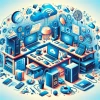
In an era where remote work is not just a trend but a fundamental shift in how businesses operate, building a robust IT infrastructure has become crucial. This guide explores the essential components and strategies for developing an IT framework that supports remote work efficiently. Whether you're a small business owner or a tech enthusiast, understanding these elements will help you navigate the complexities of remote work technology. Let's dive into the nuts and bolts of creating a seamless and productive remote work environment.
Understanding the Basics of IT Infrastructure
At its core, IT infrastructure consists of the physical and virtual resources that support the flow, storage, processing, and analysis of data. This includes hardware like servers and computers, software applications, network resources, and data storage solutions. For remote work, this infrastructure extends beyond the office walls, requiring secure and reliable access from anywhere in the world. Consider it the backbone of your organization, the unseen force that keeps everything running smoothly.
The Role of Cloud Computing
Cloud computing is pivotal in remote work setups, offering scalability, flexibility, and cost-effectiveness. By moving data and applications to the cloud, businesses can ensure employees have access to tools and information wherever they are. Services like Amazon Web Services (AWS), Microsoft Azure, and Google Cloud provide robust platforms for hosting applications and storing data. A common mistake is underestimating the importance of choosing the right cloud service provider. It's essential to evaluate factors like security, compliance, and integration capabilities before making a decision.
Ensuring Network Security
Security is a top priority for remote work. With employees accessing company resources from various locations, the risk of data breaches and cyberattacks increases. Implementing a Virtual Private Network (VPN) is a fundamental step in securing remote connections. Additionally, using Multi-Factor Authentication (MFA) can add another layer of security, ensuring that only authorized users gain access to sensitive information. Regularly updating security protocols and conducting employee training on cybersecurity best practices are crucial to maintaining a secure remote work environment.
Hardware and Software Requirements
Equipping your remote workforce with the right hardware and software is essential for productivity. Laptops, headsets, and webcams are standard, but the specifics can vary based on job roles. For instance, graphic designers may require high-performance computers with advanced graphics capabilities. On the software side, collaboration tools like Slack, Zoom, and Microsoft Teams are indispensable for communication. Remember, skimping on quality hardware or software can lead to frustration and decreased productivity.
Data Management and Storage Solutions
Effective data management is critical for remote work success. Cloud-based storage solutions like Dropbox, Google Drive, and OneDrive offer easy access and sharing of files. However, it's vital to establish clear data management policies to prevent data loss and ensure compliance with regulations. Regular data backups and implementing a disaster recovery plan can safeguard against unexpected data breaches or losses.
Integrating Collaboration Tools
Collaboration tools are the lifeline of remote teams. They facilitate communication, project management, and file sharing. Tools like Asana, Trello, and Basecamp help teams stay organized and on track. However, over-relying on too many tools can lead to confusion and inefficiency. It's important to choose a suite of tools that integrates seamlessly and suits your team's workflow.
Providing Technical Support
Technical support is often overlooked in remote work setups. Without on-site IT staff, remote employees need reliable support channels to troubleshoot issues. Implementing a helpdesk system or using remote support tools like TeamViewer or AnyDesk can provide the necessary assistance. Regular check-ins and feedback sessions can also help identify recurring issues and improve the support process.
Training and Development
Investing in employee training ensures that your team is proficient in using the technology and tools available. Offering regular workshops and creating a culture of continuous learning can boost morale and productivity. Providing resources for self-paced learning and encouraging knowledge sharing among team members can further enhance skills and adaptability.
Evaluating and Adapting IT Strategies
Technology is constantly evolving, and so should your IT strategies. Regularly evaluating the effectiveness of your infrastructure and making necessary adjustments is key to staying competitive. Gathering feedback from employees and staying informed about the latest technology trends can guide these adjustments. Remember, flexibility and adaptability are the hallmarks of a successful remote work IT infrastructure.































